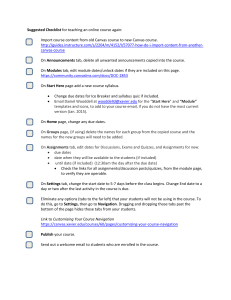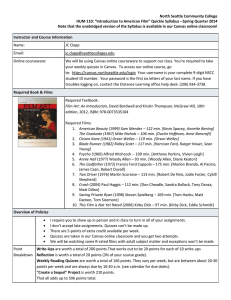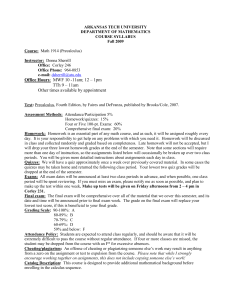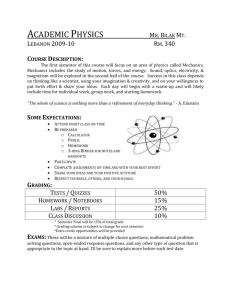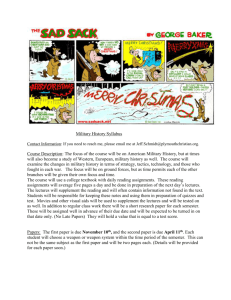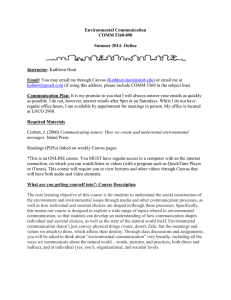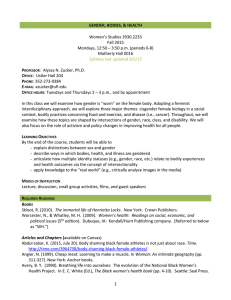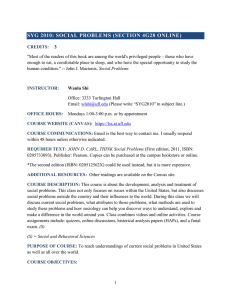Alcohol, Drugs & Society
advertisement
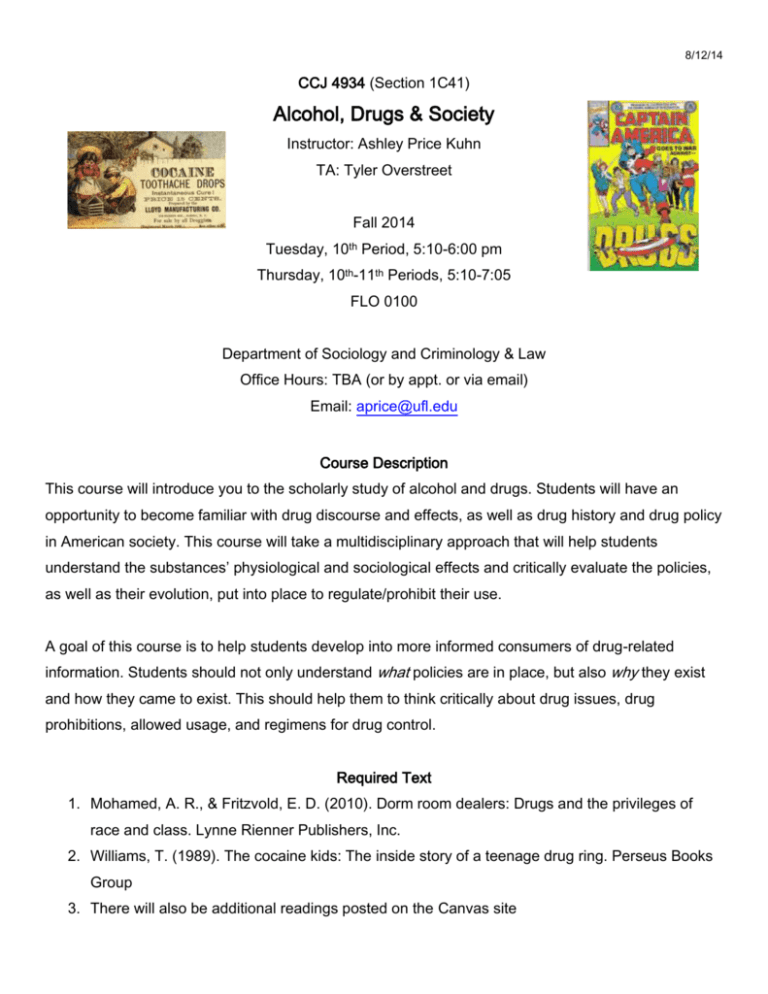
8/12/14 CCJ 4934 (Section 1C41) Alcohol, Drugs & Society Instructor: Ashley Price Kuhn TA: Tyler Overstreet Fall 2014 Tuesday, 10th Period, 5:10-6:00 pm Thursday, 10th-11th Periods, 5:10-7:05 FLO 0100 Department of Sociology and Criminology & Law Office Hours: TBA (or by appt. or via email) Email: aprice@ufl.edu Course Description This course will introduce you to the scholarly study of alcohol and drugs. Students will have an opportunity to become familiar with drug discourse and effects, as well as drug history and drug policy in American society. This course will take a multidisciplinary approach that will help students understand the substances’ physiological and sociological effects and critically evaluate the policies, as well as their evolution, put into place to regulate/prohibit their use. A goal of this course is to help students develop into more informed consumers of drug-related information. Students should not only understand what policies are in place, but also why they exist and how they came to exist. This should help them to think critically about drug issues, drug prohibitions, allowed usage, and regimens for drug control. Required Text 1. Mohamed, A. R., & Fritzvold, E. D. (2010). Dorm room dealers: Drugs and the privileges of race and class. Lynne Rienner Publishers, Inc. 2. Williams, T. (1989). The cocaine kids: The inside story of a teenage drug ring. Perseus Books Group 3. There will also be additional readings posted on the Canvas site 8/12/14 Assignments A majority of the assignments for this class are written assignments. There will be NO EXAMS!! Therefore, I expect your assignments to be thoughtful and done well. All papers will be submitted through Canvas (under the “Assignments” tab). Late papers will result in point deductions. Please PROOFREAD your work before you turn it in. Careless or numerous mistakes will drop your grade. Additionally, your responses will be run through Turnitin.com, so please do not plagiarize! If you have questions about what constitutes plagiarism please look at this guide: http://web.uflib.ufl.edu/msl/subjects/Physics/StudentPlagiarism.html 1. Introduction Paper – 5 points This paper gives me the opportunity to get to know you! Please tell me your background, educational goals, career goals, what you know about drugs, experiences with drugs (personal or secondary knowledge), and opinions about legalization and decriminalization of drugs. This paper should be between 250 and 500 words. 2. Activities – 10 points each There will be eight activity papers due throughout the semester, each worth 10 points (for a total of 80 possible points). Each response entails completing an activity and answering the questions regarding the activity. You should also provide critical reflection, focusing on how the activity relates to other course topics and readings. It is especially important that you discuss how these concepts speak to the larger topic of alcohol, drugs and society. Each activity response should be between 500 to 600 words. 3. Current Event Analysis – 20 points The purpose of this assignment is to highlight the immediate relevance of course material to drugs and alcohol in the US. The first week of class you will sign up for a topic that you are interested in analyzing a current event for. You can choose any article in a magazine or newspaper (dated between August 2014 and December 2014) and apply it to our current course discussion. You must provide a link to the article in your written analysis. This assignment requires some preparation because your article must correspond to when we are discussing that topic in class. For example, if you want to write about an article concerning recreational marijuana in Colorado, you must turn it in when we are talking about that topic in 8/12/14 class. Additionally, you should be prepared to briefly talk about your event in class. This paper should be at least 600 words. 4. Comparative Drug Policy Analysis – 30 points Drug and alcohol policies vary widely across countries. You will select a country of interest and research its policies on drugs and alcohol. There will be a list of countries you can choose from on the Canvas site. You need to email the TA Tyler (tyleroverstreet@ufl.edu) your preference by the end of week 2. Your analysis should include information on drug culture, affects on society, and drug legality. This assignment should be at least 650 words. There will be more information on Canvas, including a grading rubric. 5. Final Term Project – 100 points The media can have a great influence in forming perceptions of drug and alcohol use and drug policy, and the changing societal attitudes of drugs will be covered in this class. This final paper will take the knowledge gained about the drugs and alcohol and critically evaluate its depiction in the media in the context of historical time periods. It is essential that links be made between the film and the lecture/reading material. Please see the paper instructions on Canvas for further clarification. This paper needs to be at least 1500 words. This will serve as your final for the course; there is no final exam. There are three components to the term paper (each due at different times- see course schedule for due dates): Topic statement submitted via Canvas for approval (5 points) Progress update (5 points) Final written paper (90 points) 6. Reflection Paper – 5 points This final reflection is an opportunity to write whatever you wish about the course. There is no right or wrong way to complete this assignment. This paper should be between 250 and 500 words. Team Quizzes The second week of class students will be strategically placed into teams of 4-5. Teams formation will 8/12/14 be based on a survey of background factors that are likely to make a difference in students’ performance in the class. The goal is to make teams as diverse and fair as possible. These teams will take quizzes together on designated days throughout the semester (see course schedule for details). Students will be provided a study guide to help them prepare for each quiz. This is the only resource students will be able to use during the team quizzes. Therefore, teams that come prepared will do very well! There are 6 days throughout the semesters teams will come together to take the quizzes. Only students with university-approved absences will be approved for an individual make-up quiz. If a student is absent without an approved excuse, they will receive a zero (not their team). Additionally, there will be two opportunities throughout the semester for students to evaluate the performance of their team members. This will occur at the midpoint and conclusion of team quizzes. The purpose of peer evaluation is to keep students accountable to their teammates for their preparation and contribution to team quizzes. Final Grading Breakdown Introduction Paper 5 Activity Total (8 at 10 points each) 80 Current Event Analysis 20 Drug Policy Analysis 30 Final Term Project 100 Team Quiz Total (6 at 10 points each; 2 evaluations at 10 points each) 80 Reflection Paper 5 320 There is no curve in this class! 100-94% =A 89-87% = B+ 79-77% = C+ 69-67% = D+ 93-90% = A- 86-83% =B 76-73% =C 66-63% =D 82-80% = B- 72-70% = C- 62-60% = D- Classroom Behavior and Expectations 1. Be on time for class 59-0% =E 8/12/14 2. Be respectful of others 3. Turn off all cell phones or set them to silent before class begins 4. Do not listen to ipods, iphones, ipads, etc during lectures or talk to your neighbors 5. Use laptops, ipads, etc appropriately during class 6. Please pack up your belongings after class is over Cheating/Honor Code Violations/Conduct and Conflict Resolution DO NOT CHEAT OR PLAGARIZE. I will closely follow the guidelines about cheating/ethics violations set forth by The University of Florida. I take this very seriously. I will handle cheating on a case-bycase basis and have the ability to report any cheating to the Student Conduct Committee. If you have any questions about this process please contact Student Conduct and Resolution at 352-392-1261 ext. 207. Students with Disabilities If you are a student with a disability and need special accommodations (Note takers, exam accommodations etc.) please contact the Disability Resource Center at the beginning of the semester and follow the guidelines as set forth by the University of Florida. There is no accommodation I haven’t been able to meet, so please come talk to me. *Please review course schedule document, which is also available on Canvas*

